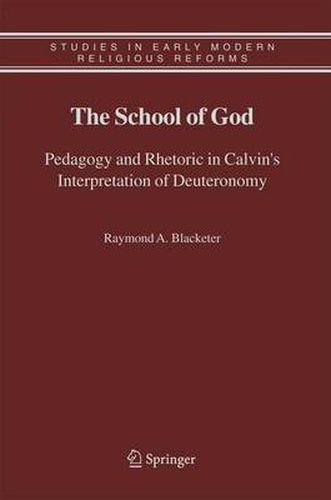Readings Newsletter
Become a Readings Member to make your shopping experience even easier.
Sign in or sign up for free!
You’re not far away from qualifying for FREE standard shipping within Australia
You’ve qualified for FREE standard shipping within Australia
The cart is loading…






This title is printed to order. This book may have been self-published. If so, we cannot guarantee the quality of the content. In the main most books will have gone through the editing process however some may not. We therefore suggest that you be aware of this before ordering this book. If in doubt check either the author or publisher’s details as we are unable to accept any returns unless they are faulty. Please contact us if you have any questions.
Calvin’s Old Testament Exegesis in Context Calvin in Context Jean Calvin, the reformer and pastor of Geneva, is renowned as one of the most important figures in what came to be known as the Reformed and Presbyterian branch of the Protestant Reformation. Perhaps less well known is the fact that he devoted the bulk of his creative efforts to prea- ing, lecturing, and commenting on the Bible. Calvin envisioned a program of reform in Geneva in which the Bible, properly interpreted, would shape the minds and morals of the Genevan populace. The people of Geneva, whom Calvin viewed as a precise spiritual reincarnation of the sti- necked, intractable Hebrews of the Old Testament, were in need of some serious remedial education, and it was his duty as their chief minister to provide the requisite training in doctrine and godliness. Despite Calvin’s emphasis on preaching and producing biblical c- mentaries, however, scholars have often portrayed him as a man of one 1 book -that one book being the Institutes of the Christian Religion. In so - ing, they have produced a one-dimensional and consequently incomplete view of Calvin’s theological work. Scholars have tended to study Calvin’s theology exclusively from the perspective of his Institutes, without taking into account his work of biblical interpretation and preaching, or the re- tionship of those efforts to the Institutes.
$9.00 standard shipping within Australia
FREE standard shipping within Australia for orders over $100.00
Express & International shipping calculated at checkout
This title is printed to order. This book may have been self-published. If so, we cannot guarantee the quality of the content. In the main most books will have gone through the editing process however some may not. We therefore suggest that you be aware of this before ordering this book. If in doubt check either the author or publisher’s details as we are unable to accept any returns unless they are faulty. Please contact us if you have any questions.
Calvin’s Old Testament Exegesis in Context Calvin in Context Jean Calvin, the reformer and pastor of Geneva, is renowned as one of the most important figures in what came to be known as the Reformed and Presbyterian branch of the Protestant Reformation. Perhaps less well known is the fact that he devoted the bulk of his creative efforts to prea- ing, lecturing, and commenting on the Bible. Calvin envisioned a program of reform in Geneva in which the Bible, properly interpreted, would shape the minds and morals of the Genevan populace. The people of Geneva, whom Calvin viewed as a precise spiritual reincarnation of the sti- necked, intractable Hebrews of the Old Testament, were in need of some serious remedial education, and it was his duty as their chief minister to provide the requisite training in doctrine and godliness. Despite Calvin’s emphasis on preaching and producing biblical c- mentaries, however, scholars have often portrayed him as a man of one 1 book -that one book being the Institutes of the Christian Religion. In so - ing, they have produced a one-dimensional and consequently incomplete view of Calvin’s theological work. Scholars have tended to study Calvin’s theology exclusively from the perspective of his Institutes, without taking into account his work of biblical interpretation and preaching, or the re- tionship of those efforts to the Institutes.